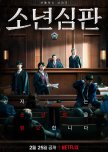This review may contain spoilers
To what extent is a child, still a child?
Juvenile Justice lingers somewhere in between social commentary and courtroom drama, as the latest instalment of Netflix’s additions to the dark genre of Korean Drama. The show follows Shim Eun Sok, a judge with a hidden past and intense dislike (or self described hatred) of young offenders. This is because often under Korean Juvenile Law, there are lesser sentences and repercussions for juveniles due to diminished responsibility.
Firstly, the main lead. She definitely did her job as a sort of anti-hero. She isn’t exactly kind or easy to categorise or ‘nice’ in the traditional sense of the word but evokes emotion and thought, which I’m certain the show runners wanted for many of these scenes. Also, as the cases go by and more is revealed about her it’s like they build a portfolio of her life, as a result of the children, the excuses that are often made for them and the damage left behind by their crimes. Her acting was superb and I think they really highlighted that they don’t care if you like her or not, she’s been through it and she’s allowed to feel everything that comes with it. Often the term ‘anti-hero’ is used in Kdramas for those who are borderline villains but serve as protagonists in a way to separate them from the antagonists they oppose. However here is one of the best depictions of a nuanced and well executed character.
As for the rest of the cast, due to the anthology like structure in which a case may cover 2-3 episodes before it’s conclusion, across the board there is some amazing performances, particularly by the mother of the elementary school boy and the Chief, who is torn between his family and justice.
The plot really asks this focal question: up until when is a child STILL a child, and when can the innocence and lack of experience at life, pardon graphic violence and abuse. The reduction of children to naive and innocent all the time doesn’t explain why the victims are never afforded the same luxury; to be seen as an innocent child who was at the mercy of an abuser, murderer or system that refuses to recognise them. It’s does not just singled out to Korea but is 100% a call for the rest of the world to re-asses crime in youths.
I also love how, typically, with this genre of gritty Korean TV, often juvenile time and violence is centred around bullying but, using real life cases, they explore crimes that affect all of society like class inequality and it’s manifestation in youth, as well as a failure to protect children with harsh upbringings and backgrounds from a life of crime to survive.
The only negative which I believe is echoed by many watchers is the desperation by the writers to force action, which causes a judge to turn into a police officer/detective/lawyer herself. I think I’m an effort to get action that wasn’t so heavy, such as the car journey involving students or murder of a child, they wanted her to be out and about, doing something. Furthermore, multiple roles could be given to her to shed the perception some may have of the show as boring or mundane. With little high speed chases, romantic cliches and major plot twists, the show is definitely geared to a more mature or legally inclined audience, who don’t mind the lack there of.
The only reason I have given this a low rewatch value despite my own high rankings, the emotion and turbulence of the show has a permanence that is drilled in by the end of the season. Rewatches are possible but the effect and message of the show are slightly less dramatic the second time round.
𝗠𝘆 𝗳𝗶𝗻𝗮𝗹 𝗿𝗲𝗰𝗼𝗺𝗺𝗲𝗻𝗱𝗮𝘁𝗶𝗼𝗻:
Juvenile Justice is for you if you’re looking for a strong female anti-hero, and prefer darker television. Slightly out of character at some points, the main lead makes up for in gut wrenching scenes that are both eloquent and poignant. A rewatch is unlikely but not impossible, yet what is the most importance is the dilemma it presents the audience with - for how long is it possible to ignore criminality in children, and better yet, how much longer can we pretend there is no problem?
Firstly, the main lead. She definitely did her job as a sort of anti-hero. She isn’t exactly kind or easy to categorise or ‘nice’ in the traditional sense of the word but evokes emotion and thought, which I’m certain the show runners wanted for many of these scenes. Also, as the cases go by and more is revealed about her it’s like they build a portfolio of her life, as a result of the children, the excuses that are often made for them and the damage left behind by their crimes. Her acting was superb and I think they really highlighted that they don’t care if you like her or not, she’s been through it and she’s allowed to feel everything that comes with it. Often the term ‘anti-hero’ is used in Kdramas for those who are borderline villains but serve as protagonists in a way to separate them from the antagonists they oppose. However here is one of the best depictions of a nuanced and well executed character.
As for the rest of the cast, due to the anthology like structure in which a case may cover 2-3 episodes before it’s conclusion, across the board there is some amazing performances, particularly by the mother of the elementary school boy and the Chief, who is torn between his family and justice.
The plot really asks this focal question: up until when is a child STILL a child, and when can the innocence and lack of experience at life, pardon graphic violence and abuse. The reduction of children to naive and innocent all the time doesn’t explain why the victims are never afforded the same luxury; to be seen as an innocent child who was at the mercy of an abuser, murderer or system that refuses to recognise them. It’s does not just singled out to Korea but is 100% a call for the rest of the world to re-asses crime in youths.
I also love how, typically, with this genre of gritty Korean TV, often juvenile time and violence is centred around bullying but, using real life cases, they explore crimes that affect all of society like class inequality and it’s manifestation in youth, as well as a failure to protect children with harsh upbringings and backgrounds from a life of crime to survive.
The only negative which I believe is echoed by many watchers is the desperation by the writers to force action, which causes a judge to turn into a police officer/detective/lawyer herself. I think I’m an effort to get action that wasn’t so heavy, such as the car journey involving students or murder of a child, they wanted her to be out and about, doing something. Furthermore, multiple roles could be given to her to shed the perception some may have of the show as boring or mundane. With little high speed chases, romantic cliches and major plot twists, the show is definitely geared to a more mature or legally inclined audience, who don’t mind the lack there of.
The only reason I have given this a low rewatch value despite my own high rankings, the emotion and turbulence of the show has a permanence that is drilled in by the end of the season. Rewatches are possible but the effect and message of the show are slightly less dramatic the second time round.
𝗠𝘆 𝗳𝗶𝗻𝗮𝗹 𝗿𝗲𝗰𝗼𝗺𝗺𝗲𝗻𝗱𝗮𝘁𝗶𝗼𝗻:
Juvenile Justice is for you if you’re looking for a strong female anti-hero, and prefer darker television. Slightly out of character at some points, the main lead makes up for in gut wrenching scenes that are both eloquent and poignant. A rewatch is unlikely but not impossible, yet what is the most importance is the dilemma it presents the audience with - for how long is it possible to ignore criminality in children, and better yet, how much longer can we pretend there is no problem?
Was this review helpful to you?





